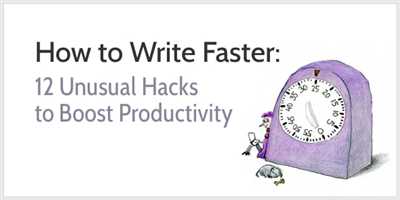
Creating engaging and captivating stories is no easy task, but what if there were simple tricks that could help you speed up the writing process? Well, we’ll let you in on a little secret – there are! No matter if you’re an experienced writer or just starting out, these tips will help you become more efficient and finish your stories in record time.
First and foremost, it’s important to focus on creating a routine. Set aside specific times each day where you can dedicate yourself to writing. Whether it’s for 15 minutes or a few hours, having a set schedule will not only train your brain to be more productive during those times, but it will also help minimize distractions and ensure that you put in the necessary effort to reach your goal.
Next, let’s talk about the power of concentration. While it may seem tempting to tinker with your work as you go along, resist the urge to constantly go back and make changes. Instead, have a “just write” mentality where you simply let the words flow without worrying about perfecting each sentence. This will allow you to keep a steady writing streak and get your first draft written much more quickly.
In addition to having a focused mindset, it’s also helpful to find a quiet and comfortable place to write. Whether it’s a cozy chair in your house or a favorite spot at the local coffee shop, having a designated writing space can help you get into the right frame of mind and minimize distractions. Make sure to have all the necessary tools at hand, including a laptop or notebook, and a playlist of music that helps you stay in the creative zone.
Now let’s talk about the three-step process that will actually help you write faster. First, start with a clear idea of what you want your story to be about. Having a solid concept in mind will make it easier to write without getting stuck or wasting time. Second, break down your story into smaller parts or chapters. This will not only make the writing process more manageable, but it will also give you a sense of progress as you tick off each section. And finally, don’t be afraid to write in sprints. Set a timer for 30 minutes or an hour and challenge yourself to write as much as possible during that time. You’ll be surprised at how much you can accomplish when you push yourself.
Remember, the key to writing faster is to focus on the process and not get too caught up in the details. Don’t worry about achieving perfection in your first draft – that’s what the editing process is for. By following these tips and tricks, you’ll be able to complete your stories in a shorter amount of time and become a more prolific writer.
So, get ready to put these methods into action and watch your writing speed improve. The difference it makes in your productivity and the number of stories you can write is astounding. Don’t let average writing speed hold you back – finish that book you’ve been working on and tell the world your story.
How to Write Faster: 8 Best Tricks to Finish Your Book Quickly
Writing a book can be a daunting task. It requires time, effort, and commitment to tell a compelling story. However, there are ways to write faster without compromising the quality of your work. In this article, we’ll explore eight tricks that can help you finish your book quickly and effortlessly.
- 1. Set Clear Goals: Before you start writing, define your goals and set a realistic timeline. Knowing exactly what you want to achieve will help you stay focused and motivated throughout the writing process.
- 2. Create a Writing Routine: Establish a daily writing routine and stick to it. Whether it’s writing for a certain number of hours or completing a specific word count, having a routine will minimize distractions and make writing a natural part of your day.
- 3. Break it Down: Rather than overwhelming yourself with the enormity of writing a book, break it down into smaller tasks. Set milestones and focus on completing each one. This will make the process more manageable and less intimidating.
- 4. Use Writing Sprints: Writing sprints are focused periods where you write continuously for a set amount of time without any interruptions. Set a timer for 25-30 minutes and write as much as you can. Take short breaks in between sprints to recharge and refocus.
- 5. Eliminate Distractions: Find a quiet place to write where you can minimize distractions. Turn off your phone, close unnecessary tabs on your computer, and create an environment that allows you to fully immerse yourself in the writing process.
- 6. Embrace Imperfection: Don’t get caught up in trying to write a perfect first draft. Remember, the goal is to finish your book quickly. Accept that your writing will need editing and revisions later on, and focus on getting your ideas down on the page.
- 7. Have a Writing Playlist: Create a playlist of music that helps you stay focused and motivated while writing. Find songs that inspire you and get you in the writing mood. This can make the writing process more enjoyable and encourage you to write for longer periods.
- 8. Take Care of Yourself: Writing for hours on end can be mentally and physically draining. Make sure to take breaks, stretch, and stay hydrated. Taking care of yourself will help you maintain focus and keep your energy levels up.
By incorporating these tricks into your writing routine, you’ll be able to write faster and finish your book more quickly. Remember, writing is a marathon, not a sprint, but with the right mindset and strategies, you can significantly improve your writing speed and efficiency. So, don’t be afraid to start, embrace the process, and watch as your book takes shape before your eyes!
Minimize distractions
As a writer, distractions can be your worst enemy. They can prevent you from achieving your writing goals and slow down your progress. However, with the right strategies, you can minimize these distractions and write stories faster. Here are three simple tricks to help you stay focused:
- Create a distraction-free environment:
- Set a daily writing routine:
- Use writing sprints:
Find a quiet place to write where you won’t be interrupted. Turn off your phone or put it on silent mode, and close any unnecessary tabs or apps on your computer. Eliminate any potential distractions in your surroundings, such as clutter or noisy objects.
Establish a consistent writing routine that works best for you. Whether it’s early in the morning or late at night, find a time of day when you’re most alert and motivated. Dedicate a specific amount of time each day to write, even if it’s just 15 minutes. By creating a daily writing habit, you’ll train your brain to focus and make writing a natural part of your routine.
If you find it challenging to stay focused for long periods, try writing sprints. Set a timer for a specific amount of time, such as 30 minutes, and challenge yourself to write as much as you can within that time frame. During a writing sprint, don’t stop to edit or tinker with your work. The goal is to write without interruptions and generate a first draft quickly. These focused bursts of writing can help you build momentum and finish your stories faster.
Remember, distractions are inevitable, but it’s up to you to minimize their impact on your writing. By creating a distraction-free environment, establishing a consistent writing routine, and using writing sprints, you’ll be on your way to becoming a faster and more focused writer.
Tell us about your book and we’ll give you a writing playlist

Are you looking to improve your writing speed and create stories faster? We understand that writing can be a time-consuming process, but with the right tricks and techniques, you can minimize the time it takes to write a book. Whether you’re a seasoned writer or just starting, we’re here to help you speed up your writing process.
Before we give you a writing playlist, let’s talk about the importance of having a routine. Creating a consistent writing routine will make a huge difference in your productivity. Set a specific time each day to sit down and write, whether it’s 15 minutes or a few hours. Find a quiet place where you can focus and eliminate distractions. By dedicating yourself to this routine, you’ll find yourself writing more effectively and efficiently.
One of the best ways to write faster is to stop editing as you go. Many writers have a tendency to tinker with their writing while they’re in the midst of drafting. However, this can slow down the creative process. Instead, give yourself permission to write a messy first draft. Don’t worry about getting every word perfect; the goal is to get your ideas out of your head and onto the page.
Another trick that can help you write more quickly is to divide your writing into focused sprints. Set a timer for a specific amount of time, such as 25 minutes, and write without stopping until the timer goes off. This type of focused writing can help you get into a flow state and minimize distractions.
When it comes to writing faster, it’s important to find a balance between speed and quality. While it’s tempting to rush through your writing, remember that the most important thing is to create a story that resonates with your readers. Take the time to craft your sentences, develop your characters, and create a compelling plot. Don’t sacrifice quality for speed.
Now, let’s talk about the writing playlist we have for you. Each person has their own natural rhythm when it comes to writing. Some people prefer complete silence, while others find that music helps them focus. If you’re someone who enjoys listening to music while writing, it can be a great tool to get into the right mindset.
Our writing playlist is designed to help you stay focused and energized while you work on your book. It features a mix of instrumental tracks from various genres, including classical, jazz, and ambient. These types of music can help you stay in a calm and creative state of mind.
The key to using music while writing is to find the right balance. You don’t want music that’s too distracting or lyrics that will pull your focus away from your writing. Instrumental music is often the best choice, as it provides a pleasant background without interfering with your thought process.
So, what’s the secret to writing faster? It’s a combination of a consistent routine, focused writing sprints, and finding the right music to help you stay in the zone. By implementing these tricks and techniques, you can make a significant difference in the speed and efficiency of your writing. And remember, the most important thing is to enjoy the process.
Improve Writing Speed By Creating A Routine
When it comes to writing, the most important thing is consistency. If you want to write faster, you need to create a routine. By establishing a daily writing habit, you can train your brain to focus and improve your overall productivity. Here are three simple tricks to help you improve your writing speed:
1. Set a writing schedule:
One of the keys to writing faster is to make it a priority in your daily life. Set aside a specific time each day to sit down and write. Whether it’s early in the morning or late at night, find a time that works best for you.
2. Minimize distractions:
Distractions can seriously hinder your writing speed. To stay focused and get things done, try to eliminate as many distractions as possible. Put your phone away, close unnecessary tabs on your computer, and find a quiet space where you can concentrate.
3. Break it down:
Writing an entire book or a long article can seem overwhelming, but if you break it down into smaller tasks, it becomes much more manageable. Set a goal to write a certain number of words or pages each day. Even if you can only spare 15 minutes, it’s better than not writing at all.
By creating a routine and following these three tricks, you’ll notice a significant improvement in your writing speed. Remember, it’s not about how long you write, but rather how focused and dedicated you are during that time. So, stop making excuses and start writing!
3 Don’t stop to tinker
When you’re in the flow of writing, it’s important to stay focused and avoid distractions. One common distraction that writers often encounter is the urge to stop and tinker with their work. Whether it’s tweaking a sentence or searching for that perfect word, these interruptions can significantly slow down the writing process.
So, what can you do to minimize these distractions and write faster? One simple trick is to set a timer for a fixed amount of time, like 15 minutes, and commit to writing without stopping or editing during that period. By forcing yourself to keep typing, you’ll be able to make progress on your story quickly and efficiently.
That’s actually the secret to writing quickly – it’s all about creating a routine and eliminating any moments where you’re tempted to tinker. You need to find a writing spot where you can fully focus on the task at hand, whether it’s at your desk, in a coffee shop, or even on your daily commute. Clear away any distractions, put your phone on silent, and create an environment that encourages creativity.
Both the physical and mental aspects of your writing space are important. Arrange your desk or chair in a way that feels comfortable and conducive to productivity. Surround yourself with objects or images that inspire you and help you get into the writing zone.
Another way to stay focused is to have all your research and source materials easily accessible before you start writing. If you know you’ll need to refer to certain articles, websites, or books, have them within arm’s reach so that you don’t have to stop and search for them mid-sentence.
Don’t let the fear of imperfection stall your progress. Remember, your first draft doesn’t have to be perfect – it just needs to be written. It’s normal to have grammatical errors or awkward sentences during this stage. The goal is to get your ideas out of your head and onto the page.
In fact, many successful writers have a streak of writing for several hours before they take a break. This dedicated effort can help you maintain your focus and make a significant difference in how quickly you can finish a story.
If you find yourself stuck or lacking motivation, try changing your writing environment. Move to a different room or go to a coffee shop. A change of scenery can often help to stimulate creativity and help you get back into the writing flow.
Furthermore, having a designated writing playlist can be a helpful tool in creating a focused atmosphere. Music without lyrics or ambient sounds can provide a soothing background that promotes concentration and helps you stay engaged with your work.
So, remember, to write faster, don’t stop to tinker. Give yourself the freedom to write without constantly self-editing. Distractions will always be there, but it’s up to you to resist their pull. By implementing these tips, you’ll be able to maintain a steady pace and finish your stories in record time.
Step 3: Put arse in chair with sprints and streaks
When it comes to writing, the most important step is simply sitting down and getting started. It may sound simple, but many writers struggle with actually putting in the time and effort to write consistently. That’s where sprints and streaks come in.
A writing sprint is a focused period of time where you commit to writing without any distractions. You set a specific goal for how many words or pages you want to write, and then you give yourself a set amount of time to work towards that goal. It could be as short as 15 minutes or as long as an hour – whatever works best for you.
The key to a successful writing sprint is to eliminate all distractions during that time. Put your phone away, close all unnecessary tabs on your computer, and focus solely on your writing. This allows you to fully immerse yourself in your story and make the most of the time you have.
Writing streaks, on the other hand, are all about consistency. The goal is to write every day, without fail, even if it’s just for a few minutes. By making writing a part of your daily routine, you train your brain to be more focused and creative during that time. It becomes a natural habit, rather than something you have to force yourself to do.
A writing streak can be a powerful tool for staying on track with your writing goals. Whether it’s 30 minutes a day or 3 hours a day, the key is to be consistent. Over time, those small chunks of writing add up and make a big difference in the speed at which you finish your book or project.
Both sprints and streaks have their benefits, so it’s up to you to decide what works best for your writing style and schedule. Some writers find that a combination of both is the most effective way to stay focused and productive.
A simple trick to help you stay on track with your sprints and streaks is to create a writing routine. Set aside a specific time each day where you dedicate yourself to writing. It could be early in the morning before the rest of the house wakes up, or late at night when the distractions of the day have settled down. Find what works best for you and stick to it.
Another secret to faster writing is to minimize distractions. Turn off notifications on your phone and computer, and find a quiet place where you can focus. If you find yourself getting distracted easily, try using productivity apps or website blockers to temporarily limit your access to social media or other time-wasting sites.
Lastly, don’t be afraid to change things up if you find yourself stuck or in a creative rut. Sometimes, a simple change in scenery or writing location can help spark new ideas and make the writing process more enjoyable. Consider taking your writing outdoors, to a coffee shop, or even to a library – anywhere that inspires you to create.
Remember, the most important part of this step is to actually sit down and write. Don’t get caught up in overthinking or procrastination. Start with a rough draft and improve it later. Just get the words down on paper (or screen) and keep moving forward. That’s how you’ll write stories faster.
Sources
When it comes to writing stories faster, there are several sources of inspiration and advice that can help you speed up your creative process. Here are some sources you can tap into:
- Set a Writing Routine: Creating a writing routine can make a huge difference in how quickly you can write. Set aside dedicated hours each day to focus solely on writing.
- Start with a 15-Minute Sprint: If you find it hard to get started, commit to writing for just 15 minutes. Once you’re in the writing flow, it will be easier to continue.
- Minimize Distractions: Put away any distractions, such as your phone or social media. Find a quiet space where you can concentrate and stay focused.
- Tell Yourself It’s a Draft: Don’t get hung up on perfection in your first draft. Give yourself permission to write freely knowing you can always revise and improve later.
- Create a Writing Playlist: Find a playlist or background noise that helps you get in the writing zone. Some writers find that instrumental or ambient music can enhance their focus.
- Get Rid of Writer’s Block: If you’re stuck, try doing something different to break through the block. Take a walk, do some exercise, or engage in a different creative activity to get your mind flowing.
- Practice Writing Every Day: The more consistently you write, the faster you’ll become. Set a goal to write a certain number of words or pages each day to build up your writing speed.
- Talk About Your Story: Discussing your story ideas with others can help flesh out your thoughts and find new angles. This can also help you get excited about your writing project.
By implementing these tips and tricks, you can become a more efficient and faster writer. Remember, the key is to practice consistently and stay focused on your goal. With time and effort, writing faster will become effortless.










